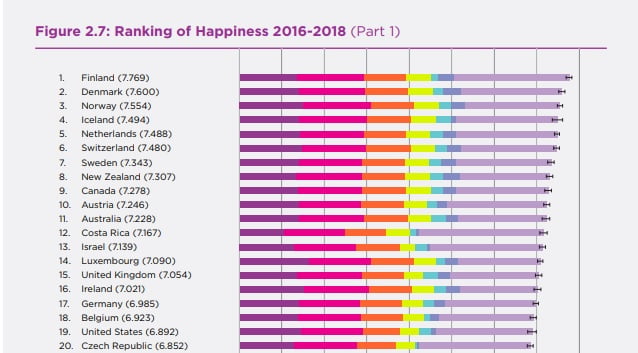Israel came in 13th in the annual United Nations World Happiness Report for 2019, dropping two spots from 11th in last’s year survey, a rank it held consecutively for five years.
The report ranks 156 countries by how happy their citizens perceive themselves to be, according to six key variables: GDP per capita, social support, healthy life expectancy, freedom to make life choices, generosity, and freedom from corruption.
SEE ALSO: Israel Ranks 10th Healthiest Nation In The World
The report has been released yearly since 2012 by the Sustainable Development Solutions Network (SDSN) at the United Nations. It is published ahead of the International Day Of Happiness marked on March 20th.
This year’s report “focuses on happiness and the community: how happiness has evolved over the past dozen years, with a focus on the technologies, social norms, conflicts and government policies that have driven those changes.”
Finland was the happiest nation according to the report, followed by Denmark, Norway, Iceland, with the Netherlands rounding out the top five. Switzerland ranked six, Sweden seventh, New Zealand eighth, Canada ninth, and Austria closed out the top 10. Australia bumped Israel from its 11th spot, followed by Costa Rica. The United States came in 19th place. The last spot for the least happy nation, 156, went to South Sudan.
The survey is based on samples of 1,000 people per year averaged for 2016-2018 for the 156 countries surveyed by the Gallup World Poll (GWP). Respondents are asked to make “a cognitive assessment of the quality of their lives on an 11-point ladder scale, with the bottom rung of the ladder (0) being the worst possible life for them and the top rung (10) being the best possible life,” also known as the Cantril ladder-of-life question.
Sign up for our free weekly newsletter
SubscribeIn the variables, Israel scored 11 in the “healthy life expectancy,” its highest score. It scored 93 – its lowest score – in “freedom,” measured by the national average of binary responses to the GWP question “Are you satisfied or dissatisfied with your freedom to choose what you do with your life?” In “corruption,” measured by the average of binary answers to two GWP questions “Is corruption widespread throughout the government or not?” and “Is corruption widespread within businesses or not?” Israel scored 74.
The report also dedicates two chapters to affairs in the United States, one titled “The Sad State of US Happiness and the Role of Digital Media” which documents “the increasing amount of time US adolescents spend interacting with electronic devices, and presents evidence that it may have displaced time once spent on more beneficial activities, contributing to increased anxiety and declines in happiness.” The second is titled “Addiction and Unhappiness in America,” looking at the “decline of American well-being in the context of a mass-addiction society.”
SEE ALSO: International Day of Happiness: What Top Israeli Studies Say About What Makes Us Happy
Chapter author Jeffrey D. Sachs, an American economist and public policy analyst, documents how “a variety of interrelated evolutionary, socioeconomic, physiological, and regulatory factors are associated with rising addiction rates across areas including drugs and alcohol, food and obesity, and internet usage.”
“The United States’ historical failure to implement public health policies that emphasize well-being over corporate interests must be addressed to respond to the addiction epidemic. Effective interventions might include a rapid scale-up of publicly financed mental health services and increased regulation of the prescriptive drug industry and other addictive products and activities,” the report reads.
Related posts

Israeli Medical Technologies That Could Change The World

Harnessing Our Own Bodies For Side Effect-Free Weight Loss

Missing Protein Could Unlock Treatment For Aggressive Lung Cancer





Facebook comments